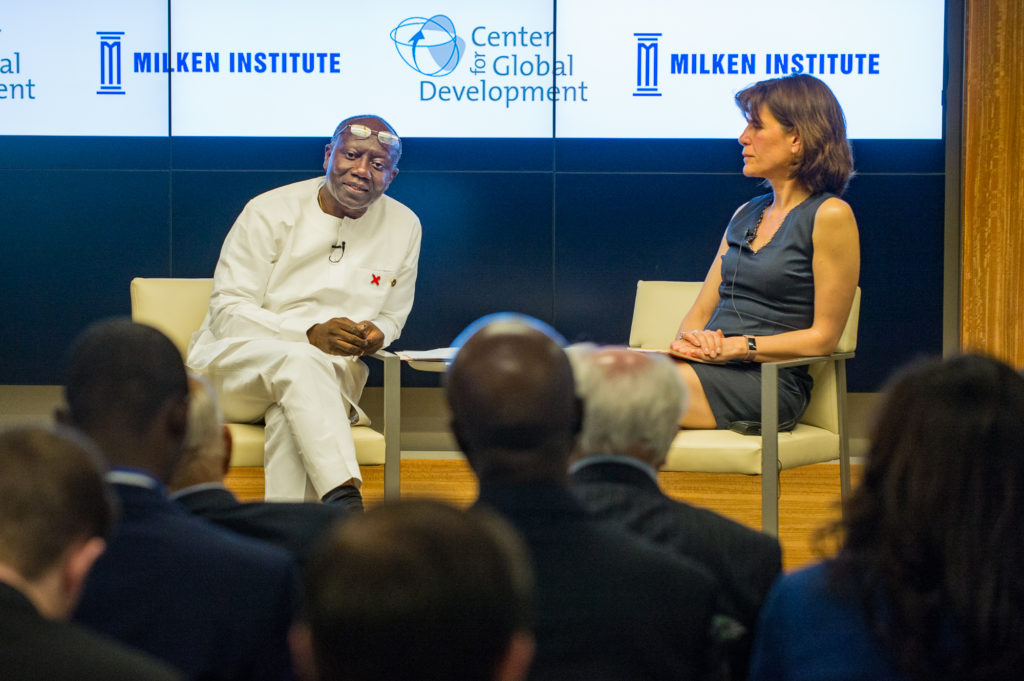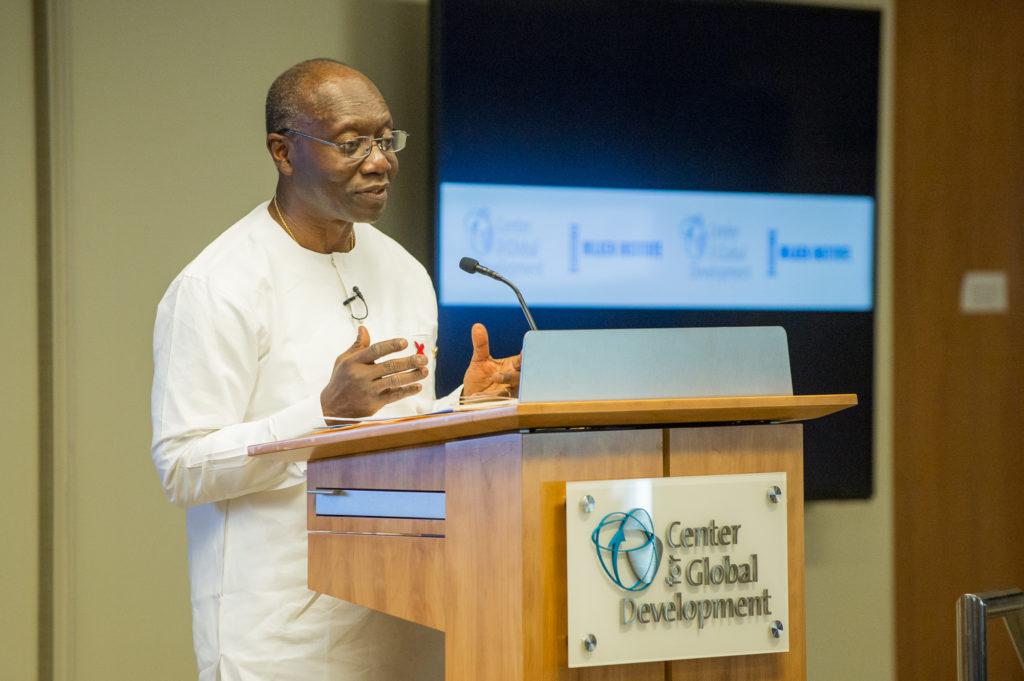
Ghana, Africa beyond aid require a paradigm shift in mindset, attitude to achieve vision, says Finance Minister Ofori-Atta
Kemi Osukoya
THE AFRICA BAZAAR MAGAZINE
April 11, 2019
Private sector-led growth, macroeconomic stability, budget consolidation along with investments in education, public health, and road infrastructures are fundamental to Ghana as well as Africa as a whole in achieving a vision of an Africa beyond aid, said Ghana’s Finance Minister Ken Ofori-Atta.
Furthermore, Ghana’s top priorities include an inclusive society, investment in human capital—education and healthcare, road and railways infrastructure as engines which will spur further innovation, and economic mobility for the Ghanaian people to improve domestic revenues mobilization in the country. Ghana also aims to become a regional financial hub for all businesses operating in and servicing the West Africa region and has begin putting in place the necessary legal and regulatory frameworks needed to establish the hub. This will help the country diversify its economy away from the natural resources, the Finance Minister said.
“A free primary and high school education— it’s unequivocal that people must have the means to access education. Education is sacred and I really think we should redefine human capital as CapEx (capital expenditure or capital expense) because it’s the real root of infrastructure that we are talking about and given the profile of our population and Africa in general, to not think of human capital as capital is deluding ourselves, so we need to figure out a way that we can ensure that this is done as we protect the future,” said Mr. Ofori-Atta.
Mr. Ofori-Atta, who is in Washington D.C. for the spring meetings of the World Bank Group and International Monetary Fund, made the remarks Wednesday at a sidelined event co-organized by Center for Global Development and Milken Institute, Washington-D.C-based think tanks.
Investments in human capital to alleviate people out of extreme poverty as well as spur economic growth for countries has not only become an important global topic, it’s now an urgent call to action for African governments to address the imminent volcanic tensions rising across the continent due to youth unemployment.

By 2050, Africa will have a quarter of the world population, an estimated 40 percent of youth population, which represents trillions of dollars trading capacity—Can the world afford an Africa that doesn’t have jobs and is not taking care of itself? It could be a global disaster or global prosperity
The Finance minister said having these fundamental elements in place will not only yield economic dividends for Ghana along with the African continent, it will ensure a balanced distribution of economic gains among population and help countries maintain a sustainable economic growth as well as development.
“To ensure an Africa beyond aid is achieved, the lessons we are learning in Ghana is the same lessons that the continent as a whole must learn,” said Minister Ofori-Atta. “As a continent, we must prioritize macroeconomic stability and budget consolidation, we must make the necessary investments in infrastructure, education and public health. We must strengthen our democratic institutions and improve our governments at all levels and perhaps most importantly, we must pursue an agenda of private sector-led growth. This means tapping into the entrepreneurship spirit that has manifest across the continent.”
Expanding on that context, he urged global investors to take a fresh look at Ghana and other African nations as potential investment destinations that can produce viable results. “Africa can be an important market [for global investors],” said Minister Ofori-Atta. “In the next decade, 350 million Africans will move to the urban areas- that’s a bit more than the population of the United States. This will be a young, rapidly growing urban markets of both consumers and industrial goods that is roughly the size of the U.S. As results of this demography and the reforms taking place across the continent, it has never been a better time to invest in Africa’s future.”
Last year, African nations established African Continental Free Trade Agreement accord to encourage and improve trading among African nations. Last week, the accord reached above the minimum threshold numbers it requires to become legislative among the 55 member states of the African Union after Gambia became the 22 country to ractify the AfCFTA. If implemented properly, the AfCFTA will cover a market of an estimated 1.2 billion markets of people with a combined gross domestic products of $2.5 trillions by eliminating high tariffs and harmonizing multitude of trades and investment systems, which could enhance traffic in trade by 2.3 percent annually, according to the United Nations Economic Commission for Africa. This will have an enormous impact on job creation across the continent. In addition to this, different countries are taking important steps to develop domestic capital markets that can tap into Africa’s savings and put it to use in the most productive way to develop a strong deep capital market. East Africa is also establishing a regional capital market integration.
These latest developments, said Minister Ofori-Atta, make Ghana and Africa attractive investment destinations for global investors looking to unlock investment opportunities outside established, conventional markets.
According to the IMF’s latest world economic outlook, Ghana, which became emancipated and graduated from the IMF’s Extended Credit Facility program last month, is set to become the fastest growing economy in the in 2019, growing at 8.8 percent. A major transformation and turnaround for the country, emerging out of a deficit of 9.3 percent, debt to GDP about 70 percent and growth anemic about 3.7 percent within a two year period. The country recently issued a $3 billion eurobonds offering, which was six times over subscribed, a testament to investors’ trust in Ghanian President Nana Akufo Addo’s leadership and determination to get the country out of debt and set it on a new sustainable economic path.
“We had sort of minted the idea of a century bond at some time in June of last year and was laughed at. But down the road, fund managers were asking when are we going to extend our curve beyond 31 years,” Minister Ofor-Atta said regarding the government’s weighing whether to issue a century bonds offering. “At first it was astounding because we went for 7 years, 12 years and 30 years ——and just to register, we have the longest bonds on the African continent and last year we went in for $2 billion but got about $8 billion and we expected somewhere around $12 billion, but we have a strong sense of momentum and we quickly ran through the $12 billion figure and before we knew we had $22 billion.”
He said getting the country out debt took discipline, and putting in place macroeconomic and structural reforms, and the determination of the Ghanaian people to be patience with the government. “We’re not done yet. Actually, I think [Ghana] is at a very vulnerable period right now, the elation and ecstatic of exit and the reality of the 2020 elections and the discipline to build a stronger foundation of resilience for the future,” he said. “We still have debt issues to deal with, infrastructure to deal with and have a population which must have social justice. And when we look at intervention, the gap between your savings and investment is huge. I think there’s a real need for debate about what happen with countries like ours—would we just come down the J-curve again or would we have a way of cutting through to continue. So what type of debt instruments is require and I think that’s the question that needs to be answer.”
The Ghanian Finance minister said to make sure the economic gains and progress in development remain sustainable for the foreseeable future, the developed world will need to chip in efforts to safeguard the global system that encourages good governance, free trade, open investment regimes and sensible immigration policies so “Africa can grow and prosper in a hospitable international environment.”
“I have spoken about the benefits of Africa’s demographic for consumers, producers and investors. By comparison, the demographic parallel is one to be fear. It’s a future of stagnant growth, overcrowding, straining infrastructure, chronic joblessness, displaced population and massive economic migration and natural resources degradation. The developed nations need to do their part to make sure we together to avoid the penury outcomes, and assure a prosperous Africa in the coming centuries- which means a prosperous world.”
He added that the “international financial institutions in D.C., [as well as ] the nations, the regions and bilateral, multilateral trade institutions are all critical part of all these global architecture and they all have an important role to play in promoting and executing policies that foster openness, transparency and global coordination and protection of global good. I’m confident that an Africa beyond aid will thrive under a mutual cooperation, understanding and respect between Africa and the West.”
Finance minister Ofori-Atta underscored that there’s a mutuality in this for everyone concerned—by 2050, Africa will have a quarter of the world population, an estimated 40 percent of youth population, which represents trillions of dollars trading capacity—“Can the world afford an Africa that doesn’t have jobs and is not taking care of itself? It could be a global disaster or global prosperity,” he said.



